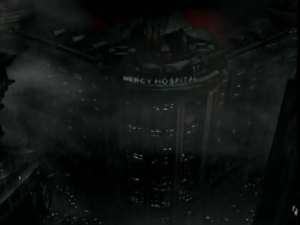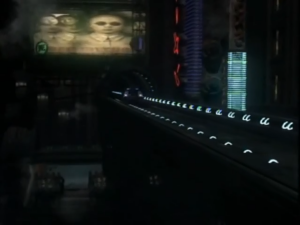A Subjectively Obscure SciFi Primer: Total Recall 2070
- January 12th, 2015
- Posted in A Subjectively Obscure SciFi Primer
- Write comment
 This month, the Subjectively Obscure Sci-Fi Primer returns to the cyberpunk side of things with Total Recall 2070. Don’t be fooled by the title, as it has practically nothing to do with the similarly-named Schwarzenegger film; it’s more of a separate (if not particularly accurate) adaptation of the same Phillip K. Dick story, “We Can Remember It For You Wholesale,” although it’s so different that the author isn’t mentioned in the credits at all. Produced in Canada, it originally aired in the US on Showtime alongside Stargate SG-1, before that show jumped networks. Showtime really had a thing for turning movies into series that had very little in common with the original film, apparently. As is typical for these obscure shows, it managed only one season, but what’s there is worth a look. It’s like Almost Human, if Almost Human didn’t hate itself for being sci-fi.
This month, the Subjectively Obscure Sci-Fi Primer returns to the cyberpunk side of things with Total Recall 2070. Don’t be fooled by the title, as it has practically nothing to do with the similarly-named Schwarzenegger film; it’s more of a separate (if not particularly accurate) adaptation of the same Phillip K. Dick story, “We Can Remember It For You Wholesale,” although it’s so different that the author isn’t mentioned in the credits at all. Produced in Canada, it originally aired in the US on Showtime alongside Stargate SG-1, before that show jumped networks. Showtime really had a thing for turning movies into series that had very little in common with the original film, apparently. As is typical for these obscure shows, it managed only one season, but what’s there is worth a look. It’s like Almost Human, if Almost Human didn’t hate itself for being sci-fi.
As the title implies, the show is set in the year 2070, by which point mankind has colonized Mars and some of the space in between, although that fact is rarely relevant to the series plot. Both planets are dominated by a handful of megacorporations, collectively referred to as “The Consortium.” Our main character, David Hume, is a detective working for the CPB, or Citizen’s Protection Bureau, until his partner is killed by a surprisingly self-aware android, and he’s in turn forced to partner up with another android, Ian Farve, to solve the case. Farve, it turns out, is an “Alpha,” an experimental android with mysterious origins who’s designed to be more human than any before. Much of Total Recall 2070‘s approach to androids is drawn from Asimov, which is always a safe way to go. Hume also has a wife, Olivia, who works for one of the megacorps and has her own biases against androids. The cast is rounded out by Olan, their forensics expert and general do-everything-science person, representative of the Assessor’s Office (the megacorps’ own private police, essentially) Calley, and the CPB’s Reasonable Authority Figure, Ehrenthal.
Total Recall 2070 takes exactly one thing from the film: the company Rekall, and its “memory vacation” technology. Everything else feels straight Blade Runner–dark streets, hyper-dense metropolis, overpowered corporations and androids that are sometimes too real. Even the soundtrack is a downplayed version of the early electronic/synth music that made Blade Runner so memorable. In this regard, one might speculate that perhaps the show was originally supposed to be a spinoff of that film, and they just couldn’t secure the rights to it. I haven’t found much to indicate either way, but I’m also far from the first to question it. Just how blatantly derivative it is turns out to be one of the show’s biggest problems.
The Good
- Since the visual style is basically Blade Runner‘s, most of the show looks great. It was actually nominated for an Emmy for Effects work in 1999 (The only non-Star Trek show to be nominated that year).
- Every episode has a plot that’s heavily rooted in sci-fi. Be it future drugs, or problems with the laws governing androids, everything makes use of the fact that it’s set in a sci-fi future, which is where it stands out compared to other SF-procedural shows like Almost Human.
- On that note, the world is a lot more fully realized than you’d expect given its divergence from the source material and preference for another movie. Whether they settled for Total Recall or not, they do make good use of the Rekall tech.
- The portrayal of the CPB is interesting, particularly in their relationship to the Consortium companies. In most of these cyberpunk-style dystopias, the government is completely dominated by the corporations, ultimately unable to do anything against them (if it even exists separately at all). In Total Recall 2070, the CPB seems to have a fair degree of independence, and the officers are definitely not lackeys for the megacorps. It’s a refreshing balance between the “working for the bad guys to fight worse guys” or “living on the edges of society” types that typically appear in cyberpunk.
The Bad
- Total Recall 2070 takes a while to get going. The first truly good episode (as opposed to just “okay”), in my opinion, is episode 7, where some of the character development in the first six (counting the double-length pilot as two) begins to pay off. This is also where some of the story arcs begin to manifest, dealing with Alpha class androids (which really kicks in by episode 10, where the show improves the most).
- Most of the acting is… eh. Michael Easton as Hume seems to be channeling Keanu Reeves very strongly, which is interesting given that it slightly predates The Matrix. Hume’s wife is completely obnoxious, although I’m hesitant to lay that entirely at the feet of the actress. Karl Pruner, who plays Farve, does his best to be the “very human android,” and his performance is not bad at all, really; and yet, any time I see someone trying to play an android, it just reminds me how good of an actor Brent Spiner had to be to pull off Star Trek‘s Data so well. To this day, I have yet to see anyone whose android performance can measure up. Meanwhile, Michael Rawlins as Ehrenthal just feels miscast to me. He doesn’t quite have the gravitas that you need in your authority figures, at least at the time this was filmed. As the show goes on, most of the actors grow into their characters and find their voices, which is common enough, but it seems like they really did struggle here.
- Though it’s not available in HD, the 90’s CGI is still pretty noticeable in places. It’s just one of those things that can’t be helped. Other aspects of the visual style that just totally baffle me are some of the anachronisms that have cropped up. A lot of the electronics devices seem dated even for 1999, like the digital planner that shows up in one early episode. The most egregious isn’t even tech related: as part of the multicultural feel the city is given, there are men running around with actual rickshaws, which is practically inexcusable in a world where they can easily travel to Mars (and Johnny Cab from the movie still exists, too). It’s clearly something added for Asian flair without much thought, intended to be evocative of the Japanese-influenced LA from Blade Runner. Another example of that lack of originality weighing the show down.
- Being a primetime drama on a premium channel like Showtime means one thing: gratuitous nudity and sex scenes. The pilot has two sex scenes in the first 15 minutes, but it’s toned down after that. Stargate SG-1 had similar issues, being forced to include nudity in its pilot as well. The good thing is that they often find a way to incorporate it into the plot; after all, one of the primary uses of Rekall tech in the real world would obviously be simulating sex, so it does add a dose of realism to see it used that way here. Still, I can’t help but roll my eyes when it shows up and feel tempted to skip ahead. I’ll stick with the plot.
This derivative nature is likely what will determine whether or not you can enjoy the show. It tries to be intellectual, but since so much of what it presents is the same old stuff, that never quite works. There just aren’t really enough new, unusual, or at least thought-provoking perspectives at work here. Are androids people? Do we, as humans, put ourselves at risk by becoming too dependent on AI? You’ve seen these themes before, no doubt, and Total Recall 2070‘s answers are the ones we usually get.
But, if you really love cyberpunk in general and Blade Runner in particular, and just want more of that, then Total Recall 2070 is absolutely your show. Charlie Jade is pretty much the only other TV series I’ve seen that makes good use of Blade Runner‘s visual style, but sustained glimpses of the Alphaverse are few and far between. And unlike Almost Human, there’s no shiny, modernesque side of the city for the show to hide in so as to keep costs down. This is 100% unfiltered cyberpunk dystopia. That definitely aided my ability to enjoy the show, almost enough to make me want to bump it up a grade.
A quick run down on my rating system: a 5 represents must-see–a “hidden gem,” as it were. A 4 is good, solid television. A 3 is “cult classic” stage, where the show’s appeal is likely limited to a specific group. A 2 is flawed, but fun, or even “so bad it’s good,” depending on the series and its release timeframe. A 1, of course, is avoid at all costs.
With that being said, I can’t justify giving it a 4 just because I happen to be in the “specific group” this time. Still, I feel like it’s a better example of cyberpunk than nearly every other attempt on TV, and it does what Almost Human tried to do better than that show ever did. So if you enjoyed watching that last year, you’ll definitely want to give Total Recall 2070 a shot. I ended up watching it (in very low quality) on youtube here, but there may be other places you can find it; most of the legal streaming services that did offer it at one point have shut down since, and it’s not on any of the big ones (Netflix, Amazon, Hulu) at the moment. Even the DVDs are quite expensive to acquire.
Have any suggestions? Or are there any little known shows you’re a fan of that you’d like me to cover? Leave them in the comments, or send a tweet to @RetroPhaseShift. To be notified of the next entry in the Subjectively Obscure Sci-Fi Primer, you can subscribe to the RSS feed by clicking here.









No comments yet.